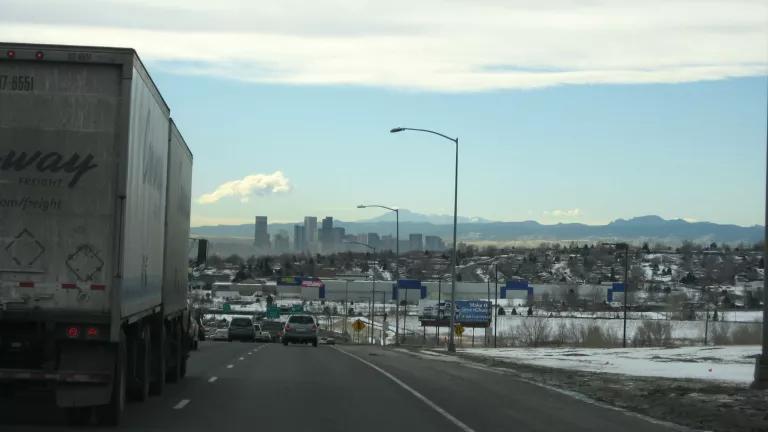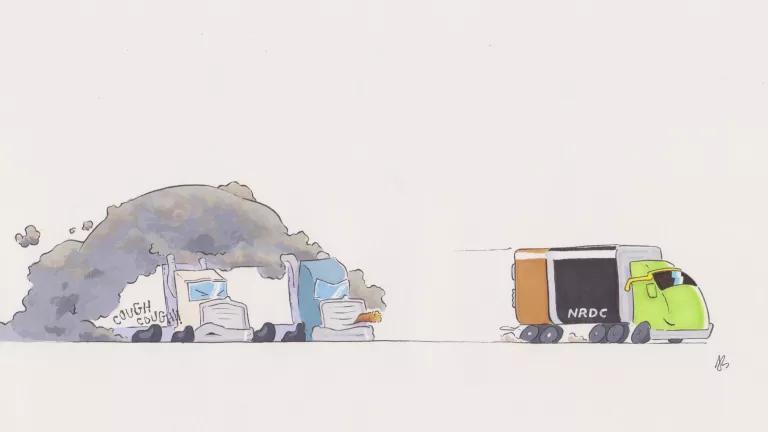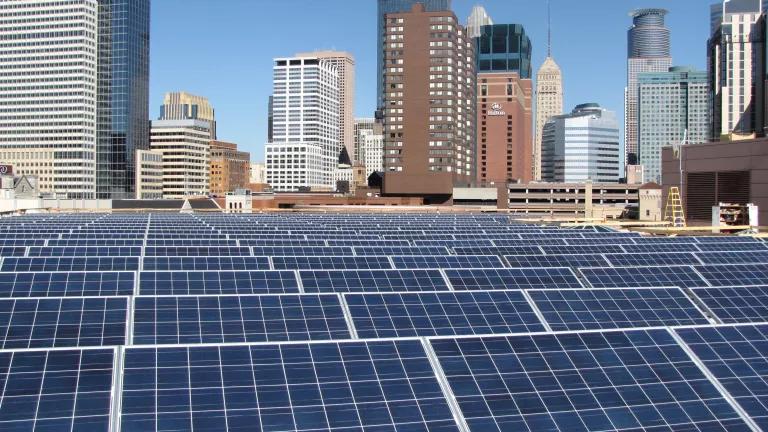Colorado's Win for Clean Trucks
Colorado voted to adopt historic standards to promote clean trucks in the state, which will reduce harmful air pollution from trucks and buses. It's time for other Western states to move forward with these safeguards.

A fossil fuel-powered truck heading to Denver.
Ken Lund via Flickr, CC BY-SA 4.0
This blog was co-authored with Jacob Belgrad of Mi Familia Vota.
In April, Colorado voted to adopt two historic standards to promote clean trucks in the state: the Advanced Clean Trucks rule and the Low-NOx rule, which will reduce harmful air pollution from trucks and buses. Together, these protective standards will slash transportation emissions, provide millions of dollars in economic benefits in Colorado, and safeguard vulnerable communities from hazardous air pollution, especially communities that live near freight corridors.
The freight corridors and industrial areas of North-East metro Denver are some of the most polluted places in the country. Diesel truck traffic is a large contributor to this air pollution, emitting poisonous NOx and particulate matter which leads to serious health impacts, including asthma and lung cancer. Low-income communities of color who live, work, and go to school in these areas are disproportionately burdened with the health impacts of this pollution.
With the support of local environmental justice organizations including Green Latinos, NAACP, Mi Familia Vota, and Womxn from the Mountain, community members took a stand against pollution and testified before the Air Quality Control Commission in support of these new clean truck standards.
“I think that all of us as a community deserve to have clean air,” said one Aurora resident in a letter to the Commission.
After thousands of supportive letters, testimonies, and stories from community members, environmental justice advocates, and technical experts, the Air Quality Control Commission voted unanimously to adopt the standards. Colorado is the eighth state to adopt clean truck protections.
A Win for Environmental Justice
These standards are a momentous win for cleaning up Colorado’s air and advancing environmental justice. The rules will reduce smog-forming pollution from Colorado’s trucks by up to 90% and kickstart the market for zero-emission truck sales, replacing polluting trucks over time. Colorado is ready for clean trucks, with state and federal funding flowing to support the transition.
The impacts of this vote are massive, especially for communities located along major freight corridors, who are largely low-income, Indigenous, and communities of color. These communities breathe the majority of the poisonous, life-threatening air pollution from fossil fuel-powered trucks. “I often walk around highways, and I feel that it gives me headaches and it becomes harder to breathe. We need healthy communities,” said a Denver community member.
Local environmental justice coalitions worked to elevate the voices of those in communities most impacted by tailpipe pollution. The coalition put together a series of town halls to foster conversations about air quality, hear about their lived experiences, and relay these stories back to the regulatory commission in the form of written comments.

A town hall gathering to discuss the clean truck rules, organized by environmental justice organizations in Aurora, CO.
Robert Rigonan/Earthjustice
These powerful testimonials made it clear that community members, who are primarily disproportionately impacted people of color, are overburdened by bad air quality caused by tailpipe emissions. After reading these comments, the Commission modified the rules to better suit Colorado’s needs and promote equity. These regulations will impact over 700,000 trucks, with far-reaching benefits.
Along with air quality benefits, the rules will also reduce greenhouse gas emissions, keeping Colorado on track to meet its climate targets. Transportation is the largest source of emissions in Colorado, and these rules show real leadership to take climate action. Facing historic drought, wildfire risk, and weather extremes, Coloradan communities needed safeguards like the clean truck rules to protect their way of life for generations to come.
The rules will also secure billions of dollars in net economic benefits, avoided public health costs to Colorado, and generate thousands of jobs in the clean vehicle and battery industries.
Other States Can Lead with Clean Vehicles
It’s time for other Western states to join Colorado and adopt these crucial regulations. As one Coloradan put it: “It’s a human right, not (a) privilege, to have access to clean air.” This is true for every state, and it’s time for other states to follow suit.
New Mexico, for example, could take similar steps to protect their residents and develop a zero-emission vehicle market in their state by adopting the clean truck rules, along with the Advanced Clean Cars II standard for light-duty vehicles. Taking these actions would build upon New Mexico’s stated climate goals and mark a decisive step in the state’s journey on climate.
Other Western states must have the same level of ambition to combat climate change, promote environmental justice, and clean up our air from vehicle pollution.



